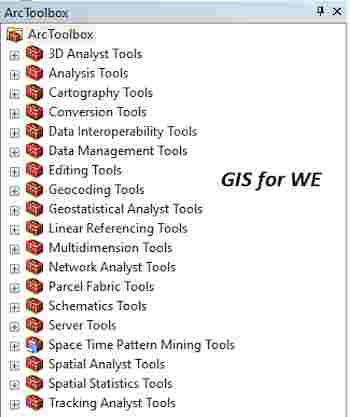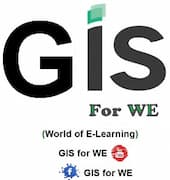Multi-Distance Spatial Cluster Analysis (Ripleys K Function) Tool
أداة التحليل العنقودي متعدد المسافات
ArcMap
ArcGIS
How to use Multi-Distance Spatial Cluster Analysis (Ripleys K Function) Tool in Arc Toolbox??
 |
| Multi-Distance Spatial Cluster Analysis (Ripleys K Function) Tool |
كيفية استخدام أداة التحليل العنقودي متعدد المسافات ؟؟
Path to access the toolمسار الوصول الى الأداة
:
Multi-Distance Spatial Cluster
Analysis (Ripleys K Function) Tool, Analyzing
Patterns Toolset, Spatial Statistics Tools Toolbox
Multi-Distance Spatial Cluster Analysis (Ripleys K Function)
Determines whether
features, or the values associated with features, exhibit statistically
significant clustering or dispersion over a range of distances.
يحدد ما إذا كانت الميزات ، أو القيم المرتبطة
بالميزات ، تعرض تجمعات ذات دلالة إحصائية أو تشتت عبر نطاق من المسافات.
1. Input Feature Class ادخل معلم الفئة
The feature class upon
which the analysis will be performed.
فئة المعلم التي سيتم إجراء التحليل عليها.
2. Output Table الجدول المخرج
The table to which the
results of the analysis will be written.
الجدول الذي ستتم كتابة نتائج التحليل عليه.
3. Number of Distance Bands عدد نطاقات
المسافة
The number of times to
increment the neighborhood size and analyze the dataset for clustering. The
starting point and size of the increment are specified in the Beginning
Distance and Distance Increment parameters, respectively.
عدد مرات زيادة حجم الحي وتحليل مجموعة البيانات
للتجميع. يتم تحديد نقطة البداية وحجم الزيادة في معلمات بداية المسافة وزيادة
المسافة ، على التوالي.
4. Compute Confidence Envelope (optional) مغلف حساب الثقة (اختياري)
The confidence envelope
is calculated by randomly placing feature points (or feature values) in the
study area. The number of points/values randomly placed is equal to the number
of points in the feature class. Each set of random placements is called a
permutation and the confidence envelope is created from these permutations.
This parameter allows you to select how many permutations you want to use to
create the confidence envelope.
·
0_PERMUTATIONS_-_NO_CONFIDENCE_ENVELOPE—Confidence envelopes are
not created.
·
9_PERMUTATIONS—Nine sets of points/values are randomly placed.
·
99_PERMUTATIONS—99 sets of points/values are randomly placed.
·
999_PERMUTATIONS—999 sets of points/values are randomly placed.
يتم حساب مظروف الثقة عن طريق وضع نقاط المعالم
(أو قيم الميزة) عشوائيًا في منطقة الدراسة. عدد النقاط / القيم الموضوعة عشوائيًا
يساوي عدد النقاط في فئة الميزة. كل مجموعة من المواضع العشوائية تسمى التقليب
ويتم إنشاء مغلف الثقة من هذه التباديل. تسمح لك هذه المعلمة بتحديد عدد التباديل
التي تريد استخدامها لإنشاء مغلف الثقة.
• 0_PERMUTATIONS _-_ NO_CONFIDENCE_ENVELOPE - لم يتم إنشاء مغلفات
الثقة.
• 9_PERMUTATIONS- تسع مجموعات من النقاط / القيم يتم وضعها بشكل عشوائي.
• 99_PERMUTATIONS- يتم وضع 99 مجموعة من النقاط / القيم بشكل عشوائي.
• 999_PERMUTATIONS- 999 مجموعة من النقاط / القيم يتم وضعها بشكل عشوائي.
5. Display Results Graphically (optional) عرض النتائج بيانيا (اختياري)
Specifies whether the
tool will create a graph layer summarizing results.
·
Checked—A line graph will be created summarizing results.
·
Unchecked—No graphical summary will be created.
يحدد ما إذا كانت الأداة ستنشئ طبقة رسم بياني
تلخص النتائج أم لا.
• تم التحديد - سيتم
إنشاء رسم بياني خطي يلخص النتائج.
• لم يتم تحديده - لن يتم
إنشاء ملخص رسومي.
6. Weight Field (optional) حقل الوزن
(اختياري)
A numeric field with weights
representing the number of features/events at each location.
حقل رقمي به أوزان تمثل عدد المعالم / الأحداث في
كل موقع.
7. Beginning Distance (optional) مسافة
البداية (اختياري)
The distance at which to
start the cluster analysis and the distance from which to increment. The value
entered for this parameter should be in the units of the Output Coordinate
System.
المسافة التي يتم عندها بدء التحليل العنقودي
والمسافة التي يجب الزيادة منها. يجب أن تكون القيمة التي تم إدخالها لهذه المعلمة
بوحدات نظام تنسيق الإخراج.
8. Distance Increment (optional) زيادة
المسافة (اختياري)
The distance to
increment during each iteration. The distance used in the analysis starts at
the Beginning Distance and increments by the amount specified in the Distance
Increment. The value entered for this parameter should be in the units of the
Output Coordinate System environment setting.
المسافة إلى الزيادة خلال كل تكرار. تبدأ المسافة
المستخدمة في التحليل من مسافة البداية وتزداد بالمقدار المحدد في زيادة المسافة.
يجب أن تكون القيمة التي تم إدخالها لهذه المعلمة في وحدات إعداد بيئة نظام تنسيق
الإخراج.
9. Boundary Correction Method (optional) طريقة تصحيح الحدود (اختياري)
Method to use to correct
for underestimates in the number of neighbors for features near the edges of
the study area.
·
NONE—No edge correction is applied. However, if the input feature
class already has points that fall outside the study area boundaries, these
will be used in neighborhood counts for features near boundaries.
·
SIMULATE_OUTER_BOUNDARY_VALUES—This method simulates points
outside the study area so that the number of neighbors near edges is not
underestimated. The simulated points are the "mirrors" of points near
edges within the study area boundary.
·
REDUCE_ANALYSIS_AREA—This method shrinks the study area such that
some points are found outside of the study area boundary. Points found outside
the study area are used to calculate neighbor counts but are not used in the
cluster analysis itself.
·
RIPLEY_EDGE_CORRECTION_FORMULA—For all the points (j) in the
neighborhood of point i, this method checks to see if the edge of the study
area is closer to i, or if j is closer to i. If j is closer, extra weight is
given to the point j. This edge correction method is only appropriate for
square or rectangular shaped study areas.
طريقة تستخدم لتصحيح التقليل من عدد الجيران
للمعالم القريبة من حواف منطقة الدراسة.
• لا شيء - لا يتم تطبيق
تصحيح الحواف. ومع ذلك ، إذا كانت فئة معلم الإدخال تحتوي بالفعل على نقاط تقع
خارج حدود منطقة الدراسة ، فسيتم استخدامها في تعداد الأحياء للمعالم القريبة من
الحدود.
• SIMULATE_OUTER_BOUNDARY_VALUES - تحاكي هذه الطريقة
النقاط خارج منطقة الدراسة بحيث لا يتم التقليل من عدد الجيران بالقرب من الحواف.
النقاط المحاكاة هي "مرايا" النقاط القريبة من الحواف داخل حدود منطقة
الدراسة.
• REDUCE_ANALYSIS_AREA - تعمل هذه الطريقة على تقليص منطقة الدراسة بحيث يتم العثور على
بعض النقاط خارج حدود منطقة الدراسة. تُستخدم النقاط التي تم العثور عليها خارج
منطقة الدراسة لحساب الأعداد المجاورة ولكنها لا تُستخدم في تحليل الكتلة نفسه.
• RIPLEY_EDGE_CORRECTION_FORMULA - بالنسبة لجميع النقاط
(j) في المنطقة المجاورة للنقطة i ،
تتحقق هذه الطريقة لمعرفة ما إذا كانت حافة منطقة الدراسة أقرب إلى i ، أو
إذا كانت j أقرب إلى i. إذا
كانت j أقرب ، يتم إعطاء وزن إضافي للنقطة j.
طريقة تصحيح الحواف هذه مناسبة فقط لمناطق الدراسة ذات الشكل المربع أو المستطيل.
10.
Study Area Method (optional) طريقة
منطقة الدراسة (اختياري)
Specifies the region to
use for the study area. The K Function is sensitive to changes in study area
size so careful selection of this value is important.
·
MINIMUM_ENCLOSING_RECTANGLE—Indicates that the smallest possible
rectangle enclosing all of the points will be used.
·
USER_PROVIDED_STUDY_AREA_FEATURE_CLASS—Indicates that a feature
class defining the study area will be provided in the Study Area Feature Class
parameter.
يحدد المنطقة التي سيتم استخدامها لمنطقة الدراسة.
تعتبر الدالة K حساسة للتغيرات في حجم منطقة الدراسة ، لذا من المهم الاختيار
الدقيق لهذه القيمة.
• MINIMUM_ENCLOSING_RECTANGLE - يشير إلى أنه سيتم استخدام أصغر مستطيل محتمل لجميع النقاط.
• USER_PROVIDED_STUDY_AREA_FEATURE_CLASS - يشير إلى أنه سيتم
توفير فئة المعالم التي تحدد منطقة الدراسة في معلمة فئة ميزة منطقة الدراسة.
11.
Study Area Feature Class (optional) فئة معلم منطقة الدراسة (اختياري)
Feature class that delineates the area over which the input
feature class should be analyzed. Only to be specified if
USER_PROVIDED_STUDY_AREA_FEATURE_CLASS is selected for the Study Area Method
parameter.
فئة المعلم التي تحدد المنطقة التي يجب تحليل فئة ميزة الإدخال عليها. يتم تحديدها فقط إذا تم تحديد فئة ميزة منطقة الدراسة المقدمة من المستخدم لمعلمة أسلوب منطقة الدراسة.
اليك صفحه ومجموعة على الفيس بوك لتعلم أكثر بما يخص نظم المعلومات الجغرافية (GIS) و برنامج ArcGIS Pro من خلال هذه الروابط:




تعليقات
إرسال تعليق